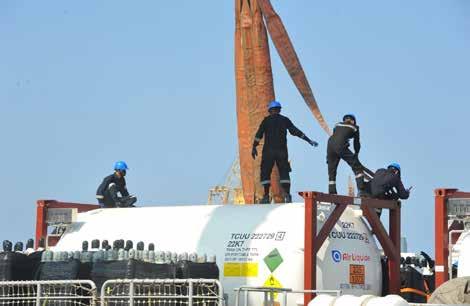
3 minute read
Indian Navy saves lives during oxygen crisis, Cyclone Tauktae
The Indian Navy has four major roles to play – military, diplomatic, constabulary and benign. During the recent weeks, the Navy has been engaged in urgent missions involving benign activities such as search and rescue, disaster relief and humanitarian aid. This was necessary as the nation has been struggling to manage the oxygen crisis caused by the COVID-19 pandemic and natural disasters such as Cyclone Tauktae.
Among the most notable developments on this front was the design and development of Mobile Oxygen Generation Plants, termed 'Oxygen on Wheels' by Naval Dockyard Visakhapatnam under the Eastern Naval Command (ENC). The plants, which are intended to meet the shortage of oxygen used in COVID-19 treatment, were inaugurated by Vice Admiral A B Singh, Flag Officer Commanding-inChief ENC. The Naval Dockyard Technical team conceived and developed the Oxygen Generation Plants with 100 litres per minute capacity, designed to provide a direct feed to any hospital's pipeline system. The Oxygen Plants, mounted on trailers, can easily be transported to remote hospitals and connected to the hospital's fixed oxygen piping system - to serve as the main feed for up to 16 beds. The Oxygen System can also serve as a backup to prevent incidents of low oxygen pressure especially in smaller hospitals and rural areas. Earlier, ships of the Indian Navy transported several tonnes of liquid
Advertisement
The recent missions of the Indian Navy included transporting liquid oxygen and tanks from abroad; developing oxygen generation plants and rescuing people from stranded and sinking vessels during the severe cyclone that hit the western coast of India


oxygen, scores of cryogenic oxygen tanks, numerous oxygen concentrators and thousands of oxygen cylinders under Operation Samudra Setu II (Ocean Bridge II) from Middle East and Singapore to meet the needs of India’s healthcare sector fighting the pandemic.
Cyclone Tauktae
Indian Navy also was also engaged in rescue missions during Cyclone Tauktae that raged off the western coast of India. For instance, in a swift response to an SOS by an Indian vessel adrift in Arabian Sea, a naval helicopter was dispatched for rescuing the stranded crew of Indian flagged Tug ‘Coromondel Supporter IX', which was adrift North West of Mangalore.
Similarly, on receipt of a request for assistance for a Barge 'P305' adrift off Heera Oil Fields in Bombay High area with 273 personnel onboard, INS Kochi swiftly sailed to render assistance. In response to another SOS received from Barge 'GAL Constructor' with 137 people onboard about 8 nautical miles from Mumbai, INS Kolkata sailed for the rescue mission.
Moreover, during the cyclone, 11 Indian Navy Diving Teams were deployed in addition to 12 Flood Rescue Teams and medical teams. Navy’s Maritime Reconnaissance aircraft on surveillance continuously broadcast cyclone warnings to fishermen.
Relief operations by naval teams were also undertaken at Kochi. Three diving teams along with Quick Reaction Teams from Southern Naval Command were deployed at Chellanam area for providing assistance to the local people stranded due to flooding. These teams ferried food, water and provisions to the relief camp which was inaccessible by vehicles due to heavy water-logging. Stranded people were ferried in Gemini rubber craft from their houses to relief camps on higher ground. The Naval teams also provided water and essentials to the Cortina Hospital which was completely inaccessible due to water-logging.
Fire safety audit
Yet another mission of the Indian Navy was a fire safety audit. Based on a request by the Chief Secretary, Government of Kerala, to conduct such an audit of government hospitals in the state, the Southern Naval Command deployed five teams to various hospitals in Ernakulam district.
After an initial assessment, an additional 22 teams were deputed for the task in the remaining 13 districts of Kerala. There are 140 government/ taluk hospitals and other treatment centres/ infrastructure handling COVID cases in the state. Teams from INS Zamorin and Indian Naval Academy at Ezhimala were deputed to conduct the audit of hospitals located in Kasaragod, Kannur and Kozhikode districts and teams from INS Agrani at Coimbatore were deputed in Palakkad.


Admiral_Karambir Singh
PVSM,AVSM,ADC Chief of Indian Navy











